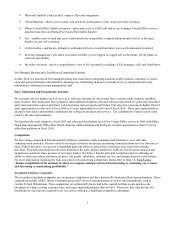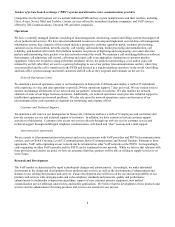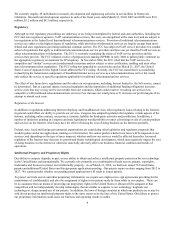8x8 2010 Annual Report Download - page 18
Download and view the complete annual report
Please find page 18 of the 2010 8x8 annual report below. You can navigate through the pages in the report by either clicking on the pages listed below, or by using the keyword search tool below to find specific information within the annual report.16
various existing and evolving standards could delay or interrupt volume production of our VoIP telephony products, subject us
to fines or other imposed penalties, or harm the perception and adoption rates of our service, any of which would have a
material adverse effect on our business, financial condition or operating results.
Our ability to offer services outside the U.S. is subject to different local regulatory environments, which may be
unknown, complicated and uncertain.
Regulatory treatment of VoIP telephony outside the United States varies from country to country and often the laws are
unclear. We currently distribute our products and services directly to consumers and through resellers that may be subject to
telecommunications regulations in their home countries. The failure by us or our customers and resellers to comply with these
laws and regulations could reduce our revenue and profitability. Because of our relationship with the resellers, some countries
may assert that we are required to register as a telecommunications provider in that country. In such case, our failure to do so
could subject us to fines or penalties. In addition, some countries are considering subjecting VoIP services to the regulations
applied to traditional telephone companies. Regulatory developments such as these could have a material adverse effect on the
use of our services in international locations.
Future legislation or regulation of the Internet and/or voice and video over IP services could restrict our business,
prevent us from offering service or increase our cost of doing business.
There are an increasing number of regulations and rulings that specifically address access to commerce and communications
services on the Internet, including IP telephony. We are unable to predict the impact, if any, that future legislation, legal
decisions or regulations concerning the Internet may have on our business, financial condition, and results of operations.
Regulation may be targeted towards, among other things, assessing access or settlement charges, imposing taxes related to
Internet communications and imposing tariffs or regulations based on encryption concerns or the characteristics and quality of
products and services, any of which could restrict our business or increase our cost of doing business. The increasing growth of
the broadband IP telephony market and popularity of broadband IP telephony products and services heighten the risk that
governments or other legislative bodies will seek to regulate broadband IP telephony and the Internet. In addition, large,
established telecommunication companies may devote substantial lobbying efforts to influence the regulation of the broadband
IP telephony market, which may be contrary to our interests.
Many regulatory actions are underway or are being contemplated by federal and state authorities, including the FCC and other
state and local regulatory agencies. On February 12, 2004, the FCC initiated a notice of public rule-making to update FCC
policy and consider the appropriate regulatory classification for VoIP and other IP enabled services. On November 9, 2004, the
FCC ruled that Vonage DigitalVoice and similar services are jurisdictionally interstate and not subject to state certification,
tariffing and other common carrier regulations. This ruling was subsequently appealed by several states. On March 21, 2007,
the United States Court of Appeals for the Eighth Circuit affirmed the FCC’s declaratory ruling.
There is risk that a regulatory agency will require us to conform to rules that are unsuitable for IP communications technologies
or rules that cannot be complied with due to the nature and efficiencies of IP routing, or are unnecessary or unreasonable in
light of the manner in which 8x8 offers service to its customers. It is not possible to separate the Internet, or any service offered
over it, into intrastate and interstate components as we currently have no means to automatically identify the physical location
of one of our subscribers on the Internet. While suitable alternatives may be developed in the future, the current IP network
does not enable us to identify the geographic nature of the traffic traversing the Internet, or dynamically pinpoint or update the
location of our customers’ telephony devices. In the United States, the FCC as well as our competitors have made statements
in the past suggesting that we should be required to automatically determine the physical location of our customers’ equipment
as a precondition for offering telecommunications services to them.
Internet service providers might restrict our ability to provide VoIP telephony services in the future.
It is not clear whether suppliers of broadband Internet access have a legal obligation to allow their customers to access and use
our service without interference. As a result of recent decisions by the U.S. Supreme Court and the FCC, providers of
broadband services are subject to relatively light regulation by the FCC. Consequently, federal and state regulators might not
prohibit broadband providers from limiting their customers’ access to VoIP applications and services, or otherwise
discriminating against VoIP providers. Conceivably, some providers of broadband access may take measures that affect their
customers’ ability to use our service, such as degrading the quality of the data packets we transmit over their lines, giving those
packets lower priority, giving other packets higher priority than ours, interfering with or blocking our packets entirely or
attempting to charge their customers more for also using our services. Interference with our service or higher charges for also
using our service could cause us to lose existing customers, impair our ability to attract new customers and harm our revenue
























